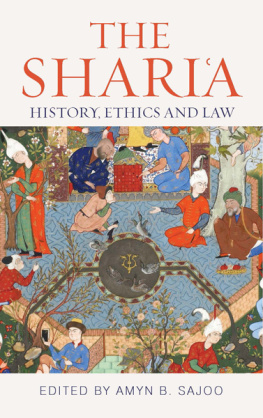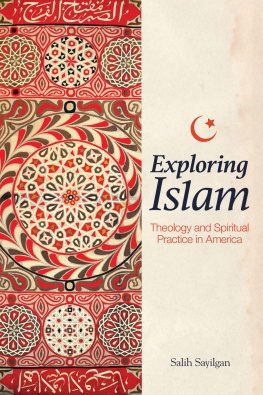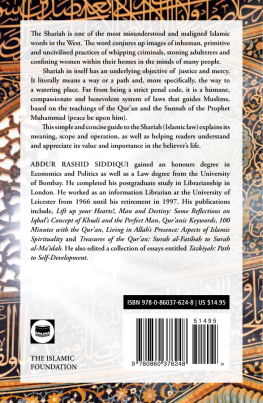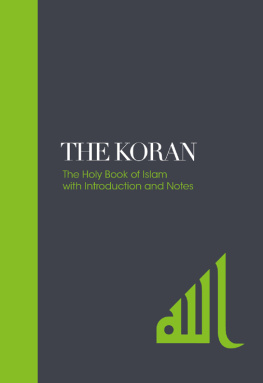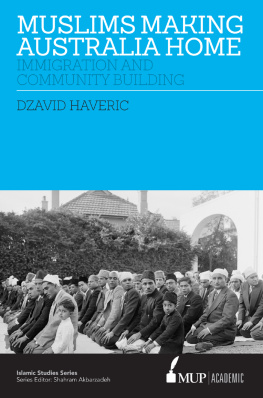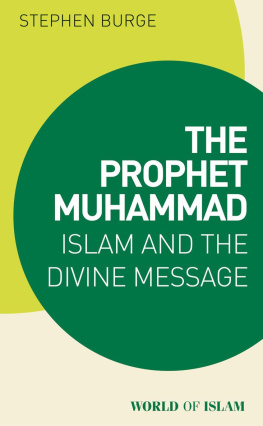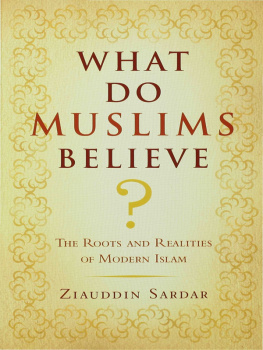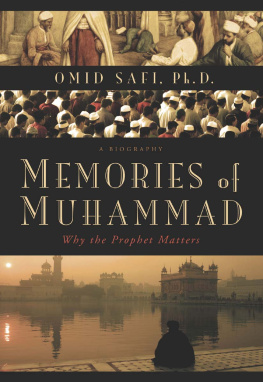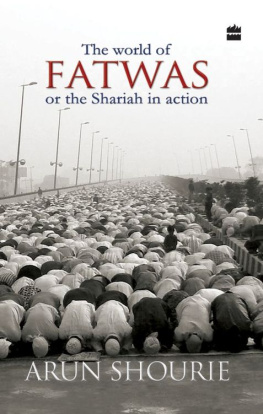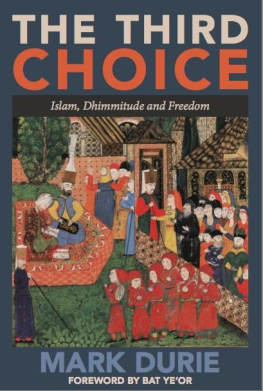
The Institute of Ismaili Studies
MUSLIM HERITAGE SERIES, 5
General Editor: Amyn B. Sajoo
This series explores vital themes in the civilisations of Islam including the nature of religious authority, ethics and law, social justice and civil society, the arts and sciences, and the interplay of spiritual and secular lifeworlds. In keeping with the Institutes mandate, the series is informed by the plurality of communities and interpretations of Islam, as well as their locus in modernity and tradition.
Previously published titles:
1. A Companion to the Muslim World, ed. Amyn B. Sajoo (2009)
2. A Companion to Muslim Ethics, ed. Amyn B. Sajoo (2010)
3. A Companion to Muslim Cultures, ed. Amyn B. Sajoo (2013)
4. The Shii World: Pathways in Tradition and Modernity, ed. Farhad Daftary, Amyn B. Sajoo and Shainool Jiwa (2015)

Published in 2018 by
I.B.Tauris & Co. Ltd
London New York
www.ibtauris.com
in association with The Institute of Ismaili Studies
210 Euston Road, London, NW1 2DA
www.iis.ac.uk
Copyright Islamic Publications Ltd, 2018
All rights reserved. Except for brief quotations in a review, this book or any part thereof, may not be reproduced, stored in or introduced into a retrieval system, or transmitted, in any form or by any means, electronic, mechanical, photocopying, recording or otherwise, without the prior written permission of the publisher.
References to websites were correct at the time of writing.
Every attempt has been made to gain permission for the use of the images in this book.
Any omissions will be rectified in future editions.
ISBN: 978 1 78831 316 2
eISBN: 978 1 78672 404 5
ePDF: 978 1 78673 404 4
A full CIP record for this book is available from the British Library
A full CIP record is available from the Library of Congress
Library of Congress Catalog Card Number: available
Typeset in Minion Tra for The Institute of Ismaili Studies

The Institute of Ismaili Studies
The Institute of Ismaili Studies was established in 1977 with the object of promoting scholarship and learning on Islam, in the historical as well as contemporary contexts, and a better understanding of its relationship with other societies and faiths.
The Institutes programmes encourage a perspective which is not confined to the theological and religious heritage of Islam, but seeks to explore the relationship of religious ideas to broader dimensions of society and culture. The programmes thus encourage an interdisciplinary approach to the materials of Islamic history and thought. Particular attention is also given to issues of modernity that arise as Muslims seek to relate their heritage to the contemporary situation.
Within the Islamic tradition, the Institutes programmes promote research on those areas which have, to date, received relatively little attention from scholars. These include the intellectual and literary expressions of Shiism in general, and Ismailism in particular.
In the context of Islamic societies, the Institutes programmes are informed by the full range and diversity of cultures in which Islam is practised today, from the Middle East, South and Central Asia, and Africa to the industrialised societies of the West, thus taking into consideration the variety of contexts which shape the ideals, beliefs and practices of the faith.
These objectives are realised through concrete programmes and activities organised and implemented by various departments of the Institute. The Institute also collaborates periodically, on a programme-specific basis, with other institutions of learning in the United Kingdom and abroad.
The Institutes academic publications fall into a number of interrelated categories:
1. Occasional papers or essays addressing broad themes of the relationship between religion and society, with special reference to Islam.
2. Monographs exploring specific aspects of Islamic faith and culture, or the contributions of individual Muslim thinkers or writers.
3. Editions or translations of significant primary or secondary texts.
4. Translations of poetic or literary texts which illustrate the rich heritage of spiritual, devotional and symbolic expressions in Muslim history.
5. Works on Ismaili history and thought, and the relationship of the Ismailis to other traditions, communities and schools of thought in Islam.
6. Proceedings of conferences and seminars sponsored by the Institute.
7. Bibliographical works and catalogues which document manuscripts, printed texts and other source materials.
This book falls into category two listed above.
In facilitating these and other publications, the Institutes sole aim is to encourage original research and analysis of relevant issues. While every effort is made to ensure that the publications are of a high academic standard, there is naturally bound to be a diversity of views, ideas and interpretations. As such, the opinions expressed in these publications must be understood as belonging to their authors alone.
Illustrations
Chapter 11
About the Contributors
Raficq Abdulla, MBE, is a barrister and visiting fellow at the University of Kingston (UK). He is a member of the Muslim Law (Shariah) Council (UK) and serves as a legal advisor to several charities and corporate bodies. He has contributed widely to literary journals and academic volumes, including A Companion to the Muslim World (London, 2009). He chaired the 20062007 Festival of Muslim Cultures in the UK. He has co-authored, with Mohamed M. Keshavjee, Understanding Sharia: Islamic Law in a Globalised World (London, forthcoming 2018).
Khaled Abou El-Fadl is the Omar and Azmeralda Alfi Distinguished Professor of Islamic Law at the University of California, Los Angeles (USA). He is the author of 14 books on various topics in Islam and Islamic law including Speaking in Gods Name: Islamic Law, Authority and Women (Oxford, 2001) and Rebellion and Violence in Islamic Law (Cambridge, 2001). El-Fadls most recent work is Reasoning with God: Reclaiming Shariah in the Modern Age (Lanham, 2014), from which his contribution to this volume () has been adapted with the kind permission of the publishers, Rowman & Littlefield.
Rex Ahdar is a Professor of Law at the University of Otago (New Zealand), and an adjunct professor of law at the University of Notre Dame in Sydney (Australia). He is the author/editor of several books, including God and Government: The New Zealand Experience (with John Stenhouse; Otago, 2000), Law and Religion (Farnham, 2000), Worlds Colliding: Conservative Christians and the Law (Farnham, 2001), Religious Freedom in the Liberal State, 2nd edn (Oxford, 2013) and Sharia in the West (with Nicholas Aroney; Oxford, 2010), from which his contribution to this volume () is adapted.
Nicholas Aroney is a Professor of Constitutional Law and a Fellow of Emmanuel College at the University of Queensland (Australia). He has held visiting positions at Oxford, Paris, Edinburgh, Emory and Sydney universities and is the author of more than 100 books, articles and chapters. He is the author most recently of The Constitution of the Commonwealth of Australia: History, Principle and Interpretation (Cambridge, 2015) and co-editor with Rex Ahdar of
Next page
